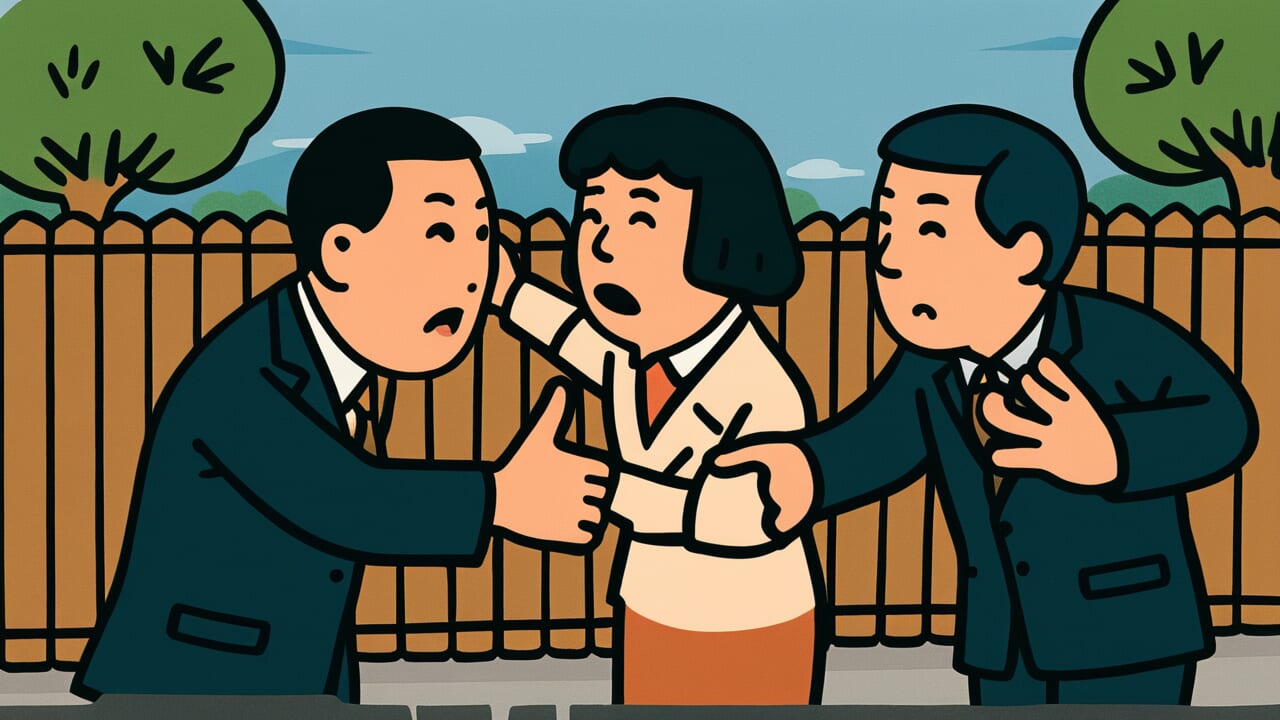How to Read “A fence and a quarrel cannot be made by one person alone”
Kakine to isakai wa hitori de naranu
Meaning of “A fence and a quarrel cannot be made by one person alone”
This proverb expresses a simple truth: conflicts cannot exist without someone on the other side.
No matter how angry one person gets, if the other person doesn’t respond, there’s no quarrel.
People use this saying when an argument is about to start or has already begun. It helps them regain their composure.
Mediators also use it to encourage both sides to show restraint.
The phrase reminds people that responsibility for a conflict doesn’t rest with just one person. Both sides play a part.
It’s especially effective for someone who thinks “the other person is wrong.” It helps them recognize their own role in the dispute.
This wisdom applies to modern situations too. Workplace conflicts, family disagreements, and social media arguments all follow the same pattern.
The lesson is simple but practical: if you want to avoid conflict, just don’t engage. It’s that straightforward.
Origin and Etymology
No clear historical records document the origin of this proverb. However, we can learn a lot from examining its structure.
The saying cleverly pairs two seemingly unrelated things: fences and quarrels.
A fence is a barrier made of bamboo or wood between properties. It marks the boundary between neighbors.
But think about it carefully. One household can’t just build a fence on their own. It requires agreement or at least understanding from the neighbor.
Quarrels work the same way. One person’s anger alone doesn’t create a fight. The other person must respond.
There’s a Japanese expression about this: “selling words and buying words.” It means both sides must participate for a quarrel to exist.
The proverb uses something concrete and familiar—a fence—to explain an abstract truth about human relationships.
It likely emerged during times when neighbor disputes were common. People needed wisdom to avoid unnecessary conflicts.
Usage Examples
- They’re fighting again, but remember: a fence and a quarrel cannot be made by one person alone. If either one backs down, it’s over.
- I was right not to take the bait from my boss. After all, a fence and a quarrel cannot be made by one person alone.
Universal Wisdom
This proverb reveals a deep truth about human relationships: the nature of “reciprocity.”
When conflicts arise, we tend to think “the other person is wrong” or “they started it first.”
But conflict as a phenomenon only exists when two people participate.
Why do people fight? Because they “respond” to attacks.
Someone insults you, so you insult back. Someone criticizes you, so you argue. Someone attacks you, so you counterattack.
This reaction is a natural human defense mechanism. It’s our instinct trying to protect our self-respect.
But our ancestors noticed something important: we have a choice here. We can choose “not to respond.”
No matter how much someone provokes you, if you don’t engage, there’s no conflict.
This isn’t just running away. It’s an active choice to break the cycle of conflict.
This proverb has endured because it acknowledges that humans are emotional creatures. Yet it also teaches that we can avoid conflict through reason.
Reacting in anger is easy. But having the courage to step back and stay calm—that’s true strength.
That’s what “a fence and a quarrel cannot be made by one person alone” tells us.
When AI Hears This
The fact that both building fences and having quarrels require two people has surprisingly deep meaning in game theory.
It relates to the concept of “minimum viable participants.”
There’s a fundamental structural difference between actions one person can do alone and those requiring two people.
Solo activities like reading or cooking are “single-agent optimization problems.” Your decisions alone determine the outcome.
But fences and quarrels exist in a state of “strategic interdependence.” The other person’s actions affect your results.
Whether they cooperate or refuse, attack or yield, changes what you should do.
This structure of “reading the other person’s move to decide your own” requires at least two participants.
What’s fascinating is that cooperative fence-building and adversarial quarreling can both be analyzed as “two-player games” mathematically.
A fence is a coordination game: “both benefit from cooperation, but one alone can’t succeed.”
A quarrel is a reciprocal game: “if they attack, you counter; if they withdraw, you withdraw too.”
They look opposite, but both share the same structure. Both require the other person’s existence and choices.
From this perspective, many human relationship problems are “logically impossible with just one person.”
To end a conflict, you need not just your own strategy change but the other person’s too.
This isn’t just morality. It’s a mathematical constraint of two-party relationships.
Lessons for Today
This proverb teaches modern people about “the courage not to fight.”
Social media flame wars, workplace conflicts, family arguments—modern society is full of potential disputes.
But you don’t have to respond to every provocation.
What’s especially important is understanding that “not responding” isn’t “losing.”
Actually, controlling your emotional reactions and staying calm shows advanced self-control. Refusing to enter someone else’s arena is a smart strategy.
In practical terms, when someone criticizes or provokes you, don’t react immediately. Take a breath first.
During that pause, ask yourself: “Is this conflict worth participating in?” Most of the time, the answer is “no.”
You have the power to break the cycle of conflict.
No matter how aggressive the other person is, if you don’t engage, it’s just a one-sided monologue.
By making this choice, you can use your time and energy for something more valuable.
Having the strength not to fight—that’s the most practical wisdom this proverb offers us today.



Comments